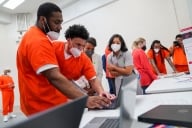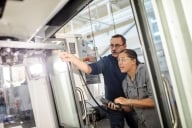You have /5 articles left.
Sign up for a free account or log in.

On-the-job experiential learning can benefit first-generation and undocumented students by giving them insight into careers in a low-stakes way.
Pekic/E+/Getty Images
Experiential learning is a valuable tool in helping students build career competencies, learn about professional work settings and explore possible careers. However, not every student has equal access to internships, job shadowing or other high-impact practices because of other responsibilities or a lack of documentation.
At NASPA’s Conferences on Student Success in Higher Education in Anaheim, Calif., Sarah McNally, assistant director of career services and employer relations at Arrupe College of Loyola Marymount Chicago, highlighted a new initiative geared toward first-generation and undocumented students.
Arrupe LEAD (learning, exploration and development) Career Fellowships offer a cohort of students two months of experiential learning in a cohort model, accompanied with reflection exercises and network connections, to help them land an internship. The experiences exposed learners to their desired career field and built professional skills as well as compensated students for their time.
The background: Arrupe College is an associate degree program within Loyola Marymount Chicago, enrolling about 340 students. Students are provided wraparound supports including a laptop, Chicago Transit Authority pass, breakfast and lunch on class days, a food pantry, embedded social workers, faculty advisers, and social programming.
Ninety-nine percent of students at Arrupe are people of color, three in four are first generation and one in six is undocumented.
Arrupe’s classes run through the summer, limiting students’ ability to participate in traditional summer internship programs and requiring staff to be creative in establishing a unique offering. For first- and second-year students, experiential learning is particularly beneficial to “try things on for size,” McNally explained.
What’s the need: Staff wanted to design programming that was inclusive of students with little to no professional experiences and who may lack documentation, because they face even more challenges in their career development, McNally said. Some students also need more confidence to feel like they can take on those experiences and additional support getting started.
Employers had indicated a need for additional preparation for students prior to starting their internships, particularly in professionalism and communication skills.
Often, short-term internships are designed for high-achieving students, but all students can benefit from these experiences, McNally shared. As a result, McNally helped design LEAD, which launched in fall 2023.
How it works: A pre-internship program, LEAD introduces students to new career paths as they gain career-related skills and build connections with potential employers.
Students take classes Monday, Tuesday, Thursday and Friday each week, leaving Wednesday available for career programming. Participants met for eight weeks, the first and final weeks focused on preparation and reflection, respectively, and the six sessions in between at an employer’s site either job shadowing or working. The average experience has been around four to five hours of work.
Program experiences were developed alongside the employer to be non-employment-based opportunities, making them accessible for undocumented students.
Arrupe College leaders see employers as co-educators in the experience, providing mentorship, guidance and industry knowledge, McNally said, so the college didn’t dictate exactly how experiences should look. Employers did agree to host a group of at least two students, building peer connections and boosting participants’ confidence.
To place students, staff created a list of the nine employer sites and had students research the site and rank their preferences before staffers divided them into small groups. Employer hosts include campus partners, such as the law school or accounting department, or off-campus groups such as Prevent Child Abuse America, Wintrust and The Chicago Sun-Times.
One of the keys to the program was asking employers for any required paperwork (such as a background check) prior to assigning students to sites to ensure students without documentation could provide alternative resources if necessary.
Participants’ daily tasks have varied by site, as some fields such as health care limited opportunities for students to gain hands-on experiences. Some students rotated through various departments at their host site, whereas others worked on a single project or initiative for the six weeks.
Each week, students complete a check-in form with reflections to promote and connect experiences to learning. Then, at the end of the program, the college applies compensation in the form of a $500 scholarship to each student’s account.
The impact: The final week of the program culminates in a lunch celebration, with faculty, staff and employers invited. Participants give presentations about their experiences and each receives a certificate to recognize their work. Students also learn how to write a professional thank-you note, which they send to their host employer after.
Around 30 students participated in each of the initial two terms, and feedback showed participants felt more confident in their ability to be a successful intern, learned more about their desired industry, acquired new skills and would recommend the program to their peers. Some students changed their major, but others were affirmed in their experiences, McNally said.
After the first term, a participant was hired as a student ambassador to guide peers through the program and support programmatic logistics. The ambassador hosts twice-weekly office hours, further promoting student success in the LEAD program.
In the future, staff plan to evaluate the program further beyond student and employer feedback.
Do you have a career-focused program that might help others encourage student success? Tell us about it.








